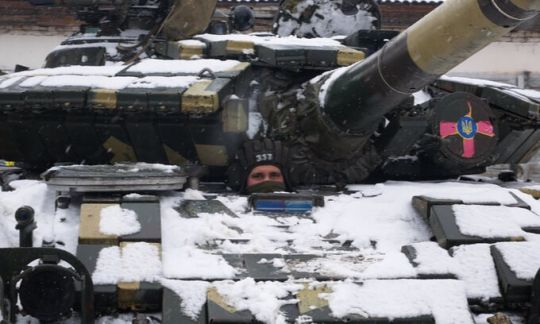Russia-Ukraine war hits Australian shares: What should investors do?

The Australian sharemarket took a hit on the day Russian President Vladimir Putin announced military action in parts of neighbouring Ukraine. It follows months of uncertainty and volatility on the markets.
While financial considerations may not be front of mind for the many Australians with connections in eastern Europe, and particularly in Ukraine, there can be a big financial fallout when an international crisis hits. But history shows markets can eventually recover.
It’s already been a bumpy ride for many investors in the Australian sharemarket this year, with many stocks down on where they were at the start of 2022. The All Ords index (ASX: XAO), which tracks the 500 largest companies listed on the ASX according to their market capitalisation, fell 2.95% last Thursday, having already been struggling to recover from significant falls in January.
Canstar spoke to a number of financial experts this week as war loomed in Europe, to ask what impact this conflict could have on the Australian sharemarket.
What impact will the Russia-Ukraine conflict have on sharemarkets?
Ahead of Russia’s invasion in parts of Ukraine, Dr Shane Oliver, Head of Investment Strategy and Chief Economist at AMP, had flagged several possible scenarios that the situation could have on markets globally and in Australia.
If the international response was both economic sanctions on Russia and NATO military intervention, he said that could have a large negative impact on markets, with possible falls of up to 15% or even 20%. Any potential recovery could take between six and 12 months, according to Dr Oliver.
If there was no NATO military reaction, only sanctions, he said the hit on markets could still be around 10%, but with recovery in about six months.
Dr John Christie, a Lecturer in Finance at the University of South Australia, has studied falls in the Australian sharemarket over several decades.
“The ASX sharemarket had its biggest one-day fall in about 18 months,” he told Canstar.
“There was probably some panic selling due to the invasion of Ukraine.”
David Bassanese, Chief Economist at BetaShares, an Australian fund manager, cautioned against any panic sell-off. He told Canstar the Russian invasion of Ukraine had now taken some of the uncertainty out of market concerns, and should be factored into any investment decisions.
“I think the market fallout from here might be fairly limited unless it escalates to other countries,” he said.
“In these times it’s important not to panic.”
Share markets can recover from a crisis
Whatever happens with the Russia-Ukraine conflict, Dr Oliver said sharemarkets have always reacted to crisis events including wars, assassinations, terrorist attacks, financial crises and the odd pandemic.
“The pattern is pretty much the same for most events, with an initial sharp fall in the share market followed by a rebound,” he said.
“Since World War Two the average decline has been 6%, but six months later the share market is up 9% on average and one year later it’s up around 15%.”
Crisis events and the US share market
← Scroll to view →
| Event | Initial market fall | One year later |
|---|---|---|
| Korean War (1950) | -12.0% | 26.3% |
| US President John F Kennedy Assassination (1963) | -2.9% | 24.0% |
| USSR invades Afghanistan (1979) | -2.2% | 21.0% |
| Iraq Invades Kuwait (1990) | -13.3% | 22.4% |
| Brexit Vote (2016) | -4.8% | 25.2% |
| Covid-19 (2020) | -31.4% | 74.4% |
Source: Shane Oliver, AMP, based on the Dow Jones Index and intended as a guide only, sourced from Ned Davis Research.
Of course, sharemarkets do sometimes take longer to bounce back, as was the case after the Global Financial Crisis in 2008.
But Dr Oliver said investors should not panic if markets continued to fall amid the Russia-Ukraine conflict. After last Thursday’s drop in the All Ords, the index has steadied.
He urged people to think of the long-term nature of investments and said it may even be a time to consider new investments, if stocks that were already appealing are now relatively cheaper.
“When shares fall, they are cheaper and offer higher long-term return prospects,” he said.
“So, the key is to look for opportunities the pullback provides. It’s impossible to time the bottom, but one way to do it is to average in over time.”
Read more: What Is Dollar Cost Averaging?
Anyone considering such a strategy would be wise to seek some independent financial advice before making any major decisions.
Remember that while sharemarkets have traditionally recovered following crises over time, past performance of a share price, an index or a particular share is no indication of future performance and there are significant risks involved in buying in a falling market.
What, if anything, should investors do now?
When sharemarkets fall, it can be tempting to cash in on your investments as you see their value fall and worry about further drops. But that can mean you may take a paper loss and turn it into a physical loss – selling any falling shares you have for less than your purchase price.
Ryan Felsman, Senior Economist at Commsec, told Canstar it was important that people don’t panic and make any rash short-term decisions about their investments.
He said the market volatility earlier this year was more likely part of what are called ‘market corrections’, which could be due to a number of factors, including a feeling among investors that some shares are overvalued.
“Keep in mind that stock market corrections are normal, even healthy,” he said.
“We did see some valuations become expensive towards the end of last year.
“But if you switch to more conservative options such as cash, you are locking in those losses.”
When it comes to the Russia-Ukraine crisis, Mr Felsman said people should look to their long-term goals and try not to be too spooked by the current situation.
“If your investment horizon is five years or more, you have the time to ride things out and see markets recover,” he said.
Rachel Waterhouse, CEO of the Australian Shareholders’ Association, told members there were no guarantees over how sharemarkets would perform during the conflict, but she too urged people to think long-term.
“Time will tell how this conflict is going to play out, but it would appear that people who are thinking long-term and acting accordingly are generally going to make the best financial decisions,” she said.
“For my part, I am going to hold my nerve and maintain my portfolio.
“Of course the biggest impact of war is on not the markets but on the people on the ground. My thoughts go out to the people in the Ukraine and I hope that peace can be achieved quickly.”
As always, if you are worried about any of your investments, you might be wise to consider seeking some independent financial advice.
Compare Online Share Trading Accounts with Canstar
If you’re comparing online share trading companies, the comparison table below displays some of the companies available on Canstar’s database with links to providers’ websites. The information displayed is based on an average of six trades per month. Please note the table is sorted by Star Rating (highest to lowest), followed by provider name (alphabetical). Consider the Target Market Determination (TMD) before making a purchase decision. Contact the product issuer directly for a copy of the TMD. Use Canstar’s Online Share Trading comparison selector to view a wider range of online share trading companies. Canstar may earn a fee for referrals.
View all Canstar rated Online Share Trading products. View Disclosures.
^^ Star ratings are awarded by research analysts based on an evaluation of price and features
^ Online brokerage fee for a $15,000 trade based on the number of transactions specified in the search inputs
# Ongoing fee for the account. There may be waivers or discounts subject to account use
Cover image source: Seneline/Shutterstock.com
This article was reviewed by our Sub Editor Tom Letts before it was updated, as part of our fact-checking process.

Michael is an award-winning journalist with more than three decades of experience. As a senior finance journalist at Canstar, Michael wrote more than 100 articles covering superannuation, savings, wealth, life insurance and home loans. His work's been referenced by a number of other finance publications, including Yahoo Finance and The Motley Fool.
Michael's worked as a reporter and producer for the BBC and ABC, including for Australian Story. He's also worked as a feature writer for The Courier-Mail and as a science and technology editor and commissioning editor at The Conversation.
Michael's professional awards include a Queensland Media Award and a highly commended in the Walkleys. In 2021 he was part of a team that was a finalist in the Australian Museum Eureka Prize for Science Journalism. He holds a Bachelor of Science in mathematics and applied physics (Manchester Metropolitan University) and a Masters of Science in pure mathematics (Liverpool University).






